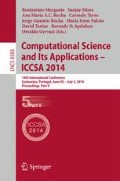Abstract
Recent research studies report evidence that many systems’ requirements are not fully understood, being difficult to elicit and produce accurate conceptual models more efficiently. We have been investigating how creative models and model-driven development can contribute to overcome this difficulty. Creative models such as mind maps offer effective cognitive support to rapidly produce conceptual models that are closer to stakeholders’ expectations. This paper reports on the results of a controlled experiment carried out in academia and industry using a creative and agile modeling approach. This approach uses mind maps to generate conceptual models through transformations, using model-driven engineering techniques. The empirical evidence discussed in this paper shows a significant gain in time spent to build conceptual models.
Access this chapter
Tax calculation will be finalised at checkout
Purchases are for personal use only
Preview
Unable to display preview. Download preview PDF.
References
Olivé, A.: Conceptual Modeling of Information Systems. Springer (2007)
The Standish Group, 2009 Second quarter research report. The Standish Group International, Inc. (2009)
Wanderley, F., Silveira, D.: A Framework to Diminish the Gap between the Business Specialist and the Software Designer. In: QUATIC 2012, Lisbon, Portugal. IEEE Computer Society (2012)
Wanderley, F., Silveira, D., Araujo, J., Lencastre, M.: Generating Feature Model from Creative Requirements using Model Driven Design. In: 16th International Software Product Line Conference, vol. 2, pp. 18–25. ACM Digital Library, New York (2012) ISBN 978-1-4503-1095-6
Basili, V.R., Caldiera, G., Rombach, H.D.: The Goal Question Metric Approach. In: Marciniak, J.J. (ed.) Encyclopedia of Software Engineering, pp. 528–532. John Wiley & Sons, Inc. (1994)
Mahmud, I.: Mind-mapping: An Effective Technique to Facilitate Requirements Engineering in Agile Software Development. In: Proceedings of 14th International Conference on Computer and Information Technology (ICCIT 2011), pp. 22–24 (December 2011)
Rathore, A.: Requirements Management, user stories, mind-maps and story-trees (2007), http://epistemologic.com/2007/04/08/requirements-management-user-stories-mind-maps-and-story-trees/ (accessed in April 2012)
Jaafar, J.: Collaborative Mind map Tool to Facilitate Requirement Engineering (RE). In: Proceedings of the 3rd International Conference on Computing and Informatics, ICOCI 2011, Bandung, Indonesia (2009)
Travassos, G., Gurov, D., Amaral, E.: Introdução a Engenharia de Software Experimental. Relatório Técnico: RT-ES-590/02, COPPE/UFRJ, Rio de Janeiro (2002)
Wohlin, C., Runeson, P., Host, M., Ohlsson, M., Regnell, B., Wesslen, B.A.: Experimentation in software engineering: an introduction. Kluwer, USA (2000)
Czarnecki, K., Gruenbacher, P., Rabiser, R., Schmid, K., Wasowski, A.: Cool Features and Tough Decisions: A Comparison of Variability Modeling Approaches. In: VaMoS 2012, Leipzig, Germany (2012)
de Vasconcelos, A.M.L., Giachetti, G., Marín, B., Pastor, O.: Towards a CMMI-Compliant Goal-Oriented Software Process through Model-Driven Development. In: Johannesson, P., Krogstie, J., Opdahl, A.L. (eds.) PoEM 2011. LNBIP, vol. 92, pp. 253–267. Springer, Heidelberg (2011), doi:10.1007/978-3-642-24849-8_19.
Giachetti, G., Alencar, F., Xavier, F., Pastor, O.: Applying i* Metrics for the Integration of Goal-Oriented Modeling into MDD Processes. UniversitatPolitècnica de Catalunya, Barcelona, Spain (2010)
Franch, X., Grau, G.: Towards a Catalogue of Patterns for Defining Metrics over i* Models. In: Bellahsène, Z., Léonard, M. (eds.) CAiSE 2008. LNCS, vol. 5074, pp. 197–212. Springer, Heidelberg (2008)
Franch, X.: A Method for the Definition of Metrics over i* Models. In: van Eck, P., Gordijn, J., Wieringa, R. (eds.) CAiSE 2009. LNCS, vol. 5565, pp. 201–215. Springer, Heidelberg (2009)
España, S., Ruiz, M., Gonzáles, A.: Systematic derivation of conceptual models from requirements models: a controlled experiment. In: on Research Challenges in Information Science (RCIS) (2012)
Author information
Authors and Affiliations
Editor information
Editors and Affiliations
Rights and permissions
Copyright information
© 2014 Springer International Publishing Switzerland
About this paper
Cite this paper
Wanderley, F., Silveira, D., Araujo, J., Moreira, A., Guerra, E. (2014). Experimental Evaluation of Conceptual Modelling through Mind Maps and Model Driven Engineering. In: Murgante, B., et al. Computational Science and Its Applications – ICCSA 2014. ICCSA 2014. Lecture Notes in Computer Science, vol 8583. Springer, Cham. https://doi.org/10.1007/978-3-319-09156-3_15
Download citation
DOI: https://doi.org/10.1007/978-3-319-09156-3_15
Publisher Name: Springer, Cham
Print ISBN: 978-3-319-09155-6
Online ISBN: 978-3-319-09156-3
eBook Packages: Computer ScienceComputer Science (R0)

